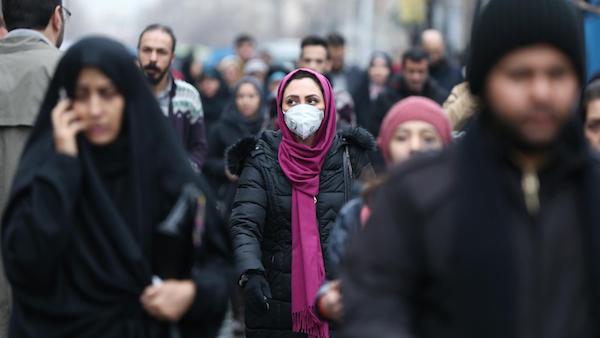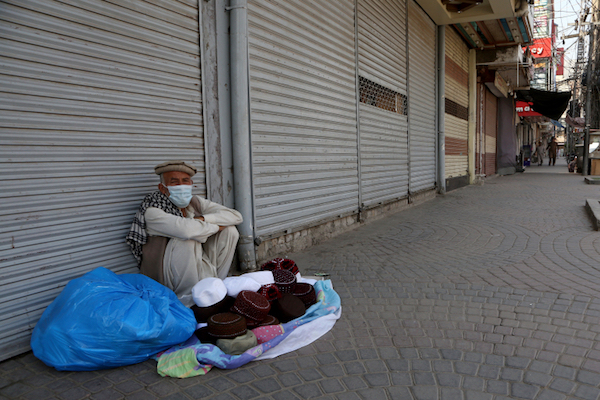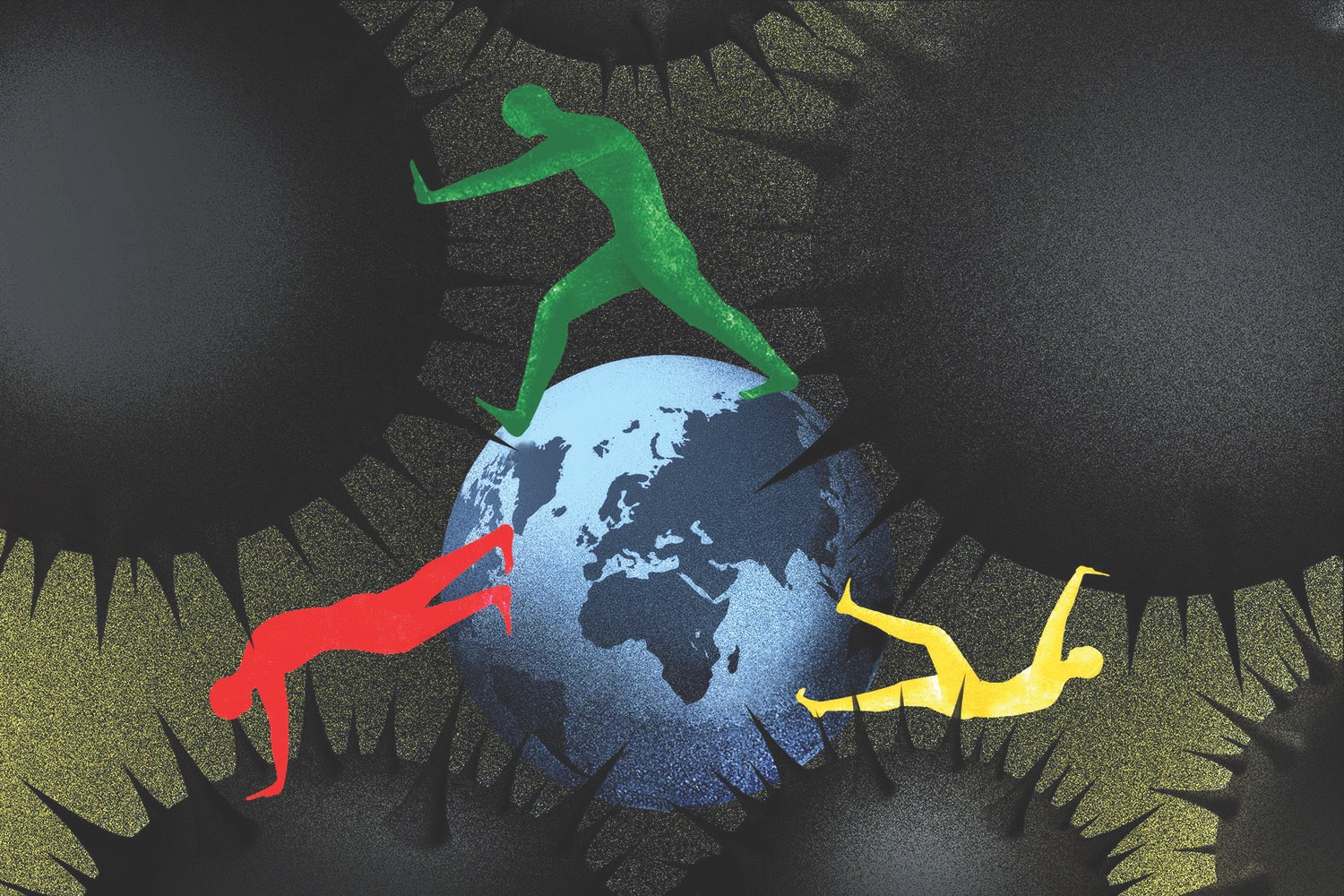The spread of infectious disease in the world, commonly recognized as Covid-19, has shaken the traditional foundations of the international system. A long list of strategic differences between states has become the issue of relatively less important for the international community before the rise of the novel coronavirus. The rise of coronavirus from Chinese city (Wuhan) and then its spread in the outside world has placed the whole international system under an indefinite period of health challenges because the ongoing wave of a health crisis due to the spread of the viral infectious disease has alarmed the medical bells of the nations. The governments of all states are compelled to redefine their strategic priorities by considering the health crisis a severe problem to their countries. The nations’ security architectures have translated the recent wave of coronavirus as the gravest threat to the states while passing through a most critical time of history. The leaders of different nations have accepted the severity of the coronavirus because of its worldwide outreach, which did not spare even a single country. The varying levels of its devastating effects on the international system did not spare even a single country parallel to changing the nature of corona-intensity across the world. However, it has shocked the whole international system. The states from different regions, having people of diverse ethnic affiliations, are equally vulnerable in the contemporary phase of a global health emergency.
Under the worldwide environment of a health emergency, the governments of different states have decided to launch an international corona-combating campaign. Promoting the campaign for preventing and containing the spread of the viral infectious disease has resulted in a consensus-based alliance of the nations. The global corona-combating alliance has compelled the ruling political parties of different countries to protect their citizens by reducing the movement of people with the help of a planned social lockdown. As a result, the varying levels of lockdowns in the world affected the nations’ political, economic, and social infrastructures. People living under various levels of lockdowns are compelled to alter their positions in the society because the pandemic crisis has triggered disastrous effects beyond the socio-economic and political spheres of nations. The infected societies have accepted the severity of the crisis, and the leading societal trends based on conventional ways of maintaining communicating interactions has been changed. An international culture of social interaction through nonverbal means has been challenged during the corona crisis, but the emotional values of social touching have become an outdated cultural norm. In other words, the nonverbal means of emotional communication containing negative and positive messages have become a part of cultural history in which humankind learned to improve its socializing ways.
Social touching always considered to be an essential part of cultural networking because the major means of communicating the emotional expressions always remained a gravitational point of interpersonal communication. The traditional societal structures formulated on the basis of close emotional interactions always prevailed in cross-cultural communications. The people living across territorial borders prefer to carry a common culture of social touching. Even the main sources of haptic communication, which were developed and adopted by the general public across the borders, always referred to a strong force of interpersonal socializing. The haptic cultural connections based on nonverbal communication by utilizing the sense of touch have always been among the most decent and sophisticated societal norms. In this way, the sense of touching has been accepted as a conventional means of emotional nonverbal communication, which usually conveyed feelings of pain, happiness, heat, cold, anger, violence, confusion, and sadness.

Moreover, the human actions for social networking across the globe always share universal norms of social touching for conveying emotional feelings through shaking and clasping hands and pushing and pulling human bodies. The social touching shaped a number of nonverbal actions such as striking, kicking, and strangling, because the role of social touching generally interprets various cultural dimensions of a nation. In close social networking, social touching has been recognized as an influential source of conveying support, greet, appreciation, and affection. The amount of touch varies from person to person when it occurs within a culture, and the contexts and contents of haptic means of communication also vary at different times. In short, the value of haptic communication in interpersonal relationships is always accepted as a standard universal norm of even cross-cultural interaction. A universal culture of touching is standard in every nation, and it generally conveys the feelings in a relationship equivalent to indicating the intensity of expressions in the society.
Contrary to the mentioned-above history of cultural developments in the international system, the rise of the pandemic in the world has hampered the cultural communication of the communities. A common culture formulated on the notion of a defined personal boundary has been considered as an appropriate means of communication. Through personal boundaries, individuals of different societies have adopted various cultural communication methods while maintaining a safe distance. People started practicing social distancing and self-isolating effective ways of managing an indefinite period of the health crisis. The adaptation of socially-distanced standards in the general public further promoted a norm of quarantining at safe places while ensuring the society’s hygienic lifestyles. In this way, the physical loneliness and social isolation became dominating trends in the world due to the prevalence of an international environment of advanced health concerns. Due to the diminishing role of traditional ways of expressing feelings and showing emotional attachment through touching, a global culture of non-tactile attributes became an apparent social trend. The publicly distant and practically isolated segments of the society are forced to adopt a non-tactile emotional culture of common values under an effective technique for preventing the spread of coronavirus. The efforts to cultivate an effective social interaction has further resulted in a universal culture of online interaction through digital conversations. Moreover, the wearing of surgical masks and keeping a safe distance has fabricated a global culture of common social attributes.
The governments’ legislative circles are intended to legalize the national social distancing guidelines as the main principles for keeping the people medically safe and secure. Governments worldwide are trying to design various public initiatives to counter the spread of the pandemic. In this way, a new health competition has been inaugurated in the world between different governments because the intensity of novel-corona various varies from state to state. The magnitude of its impacts on society also differs due to the efforts of government officials. In addition to the increasing strength of medical facilities, the state officials from different countries have introduced a number of corona-preventing measures in society. The government responses from containment to closure policies mainly revolve around limiting free movement because restricting people’s movements has been considered an appropriate measure for eradicating the spread of Covid-19. In addition to limiting of different social activities of the people, the canceling and postponing of different events of national and international importance became a vibrant trend in the world. The leading policymakers of the affected countries decided to adopt several universal measures centered on altering the interpersonal social behaviors for eliminating the threats of the Covid-19 to their nations. Internationally, the leaders of different countries tried to implement a broader framework of modifying people’s daily life patterns by introducing numerous corona-preventing practices.
A reasonable distance in interpersonal communication has become a global norm under the broader concept of social learning. The international society has forced to accept social and cultural changes because humanity is experiencing an unforgettable time of history. A global confrontation with the culture of a haptic feeling has become a worldwide norm, and the human living throughout the world are willing to forget their cultural associations to different ethnic groups. People living under different cultural setups have decided to embrace a universal culture of sensitive health measures.
A reasonable distance in interpersonal communication has become a global norm under the broader concept of social learning. The international society has forced to accept social and cultural changes because humanity is experiencing an unforgettable time of history. A global confrontation with the culture of a haptic feeling has become a worldwide norm, and the human living throughout the world are willing to forget their cultural associations to different ethnic groups. People living under different cultural setups have decided to embrace a universal culture of sensitive health measures. An undefined era of uncertainty and confusion is the fundamental force behind the up-grading of social and cultural norms. This development is due to the formulation of a worldwide consensus among the leading health officials on the adaptation of common health culture. These cultural changes inherited in social ostracism prevailing in the people have molded the nations’ societal directions. In other words, the reasons behind social and cultural changes that are occurring around the globe are attached to the spread of a deadly disease. A worldwide atmosphere of fear and confusion pressured the people of different nations to redefine their ways of living by adopting highly sensitive healthcare measures. In reaction to this situation, the adaptation of precautionary measures advised by a health official, and adopted by political authorities has become a significant source of cultural transformation.

The lack of haptic expressions in interpersonal communication has been considered a landmark development in the cultural history of the world. The rise of the pandemic in the international system has left the people with limited choices. The available choices under the recommended formats of social networking are now restricted to a universal culture of physical distance. The people around the world are compelled to practice social distancing because keeping a recommended physical distance in society is the only way to prevent the community spread of the Covid-19. As a result, a universal turn in the global culture structured in a common touch-deprived or touch-starved social attribute has become a powerful source for cultural evolution. An unstoppable or undeniable process of persistent growth of cultural values has entered a new era of social changes. The phase of cultural developments has incorporated different societal trends backed by highly hygienic medical standards due to the spread of a fearful deadly disease. The disease affecting all the states across the territorial borders has brought cultural changes across the borders. Its high rate of fatality has required the political administrations of various nations to legalize the cultural changes designed under the deadly impacts of the Covid-19. In other words, a unique combination of fear and anxiety alarmed the countries’ security establishments, and the ruling political authorities are planning to defend their citizens by implementing different medical steps in society.
The Covid-19 pandemic has emerged as the most crucial global health challenge, which has disturbed the conventional foundations of global social and cultural orders of the nations because mankind is passing through a critical time of history. In the presence of an extremely disturbed and socially distanced environment, the resumption of healthy life for recommencement normalization has become a difficult task. How to return the reality of normal life has become an unanswered question due to the uncertain circumstances of international society. The resumption of social interaction based on traditional haptic customs of the nations are difficult to keep the people safe in interpersonal communications. In response to the emerging global health concerns, the cross-culture socializing norms are limited to the little-to-no physical contact because the customs of touching have always remained the fundamental languages of social connections. A global culture of touch-deprived customs and less-emotional norms is likely to encircle the interpersonal communications in the societies. It will further decrease the role of emotional perception linked to society’s haptic norms because the slowing down of the spread of Covid-19 has become an international concern. As a result, a society of less socializing designs has been developed. The general public is forced to live in a life of closeness-deprived values in which the feelings of vulnerability, happiness, loneness, and fearfulness are becoming emotion-less. The wearing of surgical masks parallel to carrying a safe distance equipped with many disinfecting measures hides the facial emotions of individuals. Additionally, the transformation of interpersonal interaction in the digital world further made the general public harder to see the body movement.
The disappearance of facial expressions and body language, coupled with the prevention of whispering habits in the general public, has transformed the conventional foundations of a culture of human interaction. Thus, the international community’s future will be based on an upgraded framework of social attributes that will help defend the people from the rise of any pandemic in the world. The nations carrying highly precautionary measures in the health sector parallel to aligning their society to the global medical standards would be considered the norms of advanced and developed nations of the world. The support to the global health standards will enable the political authorities of the different countries to empower their societal health through upgrading their medical infrastructure. The societies structured on highly sensitive medical standards would be considered stable and secure societies in the world. The countries carrying health measures would be considered the highly responsible and sensible nations of the world.
The persuasion of a proper social distancing mechanism and its implementation in all society segments have become the top priorities of the state governments. The rise of pandemic and worse impacts on the people have left everyone in a terrible shock and surprise. An undefined phase of countrywide lockdown at different levels has further intensified a general feeling of fear and anxiety in society. In response to a challenging and changing culture of different societal precautionary measures followed by the health officials’ medical recommendations, the state authorities of affected nations are determined to defeat the viral enemy. The battle against a common threat of disease has brought a culture of medical norms in the world. The people living across the territorial border have started finding several substitutes for the physical contacts to carry effective means of social communication channels. As a result, persistent growth of cultural evolution has emerged as an undeniable reality and an unquestionable truth in the world.




